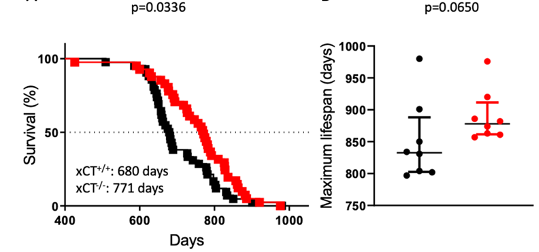Key Points:
- Genetic deletion of the xCT – a transporter that moves the amino acids glutamate out of the cell and cystine into the cell – increases the lifespan of mice.
- Deleting xCT reduces the age-related body-wide overactive immune response and improves the inflammatory status of the hippocampus – a brain region associated with memory.
- Loss of xCT improves aspects of both short-term and long-term memory.
After a delicious meal, the protein we eat breaks down into amino acids. Amino acids are the building blocks of proteins yet serve a diverse array of functions on their own. For this reason, amino acids are delicately balanced across the membranes of our cells, a process mediated by specific transporters that move amino acids into and out of cells. Losing just one of these amino acid transporters could have profound effects on how long we live and if we’ll have age-related memory loss.
As reported in the journal Molecular Psychiatry, Verbruggen and colleagues from Vrije Universiteit Brussel in Belgium found that the deletion of a specific amino acid transporter called xCT increased lifespan by 13%, reduced inflammation, and improved memory in mice. These findings suggest that targeting xCT can prevent cognitive decline and promote healthy aging in humans.
Deletion of the Amino Acid Transporter xCT Improves Lifespan
Amino acid transporters move amino acids into and out of cells. The xCT amino acid transporter moves glutamate out of the cell and cystine into the cell, maintaining the balance of both amino acids. Genetic deletion of xCT in mice disrupts this balance but also reduces inflammation. Inflammation is a hallmark of aging, as it increases with age and is associated with age-related diseases like dementia and cognitive decline. Verbruggen and colleagues investigated the consequences of xCT deletion in mice by assessing lifespan and memory.
To examine how longevity is affected by xCT, Verbruggen and colleagues measured the lifespan of mice that had xCT genetically deleted (xCT-/- mice). The Belgian researchers found that the xCT-/- mice lived about 13% longer than control mice. The average maximum lifespan of the xCT-/- mice also seemed higher but did not reach statistical significance. These findings show that xCT deletion can enhance longevity.
Based on the 13% increase in mouse lifespan, deleting xCT would make us live about ten years longer. According to the National Center for Health Statistics, the 2020 average lifespan of United States citizens was 77.8 years. A 13% increase from 77.8 years is about 87.8 years. In other words, getting rid of an amino acid transporter could hypothetically help us live closer to the age of 90.

(Verbruggen et al., 2022 | Molecular Psychiatry) Deletion of Glutamate/Cysteine Transporter Prolongs Lifespan. Mice with xCT deletion (red) live longer than mice with an intact xCT transporter (black). (left) The number of days lived by each mouse (represented by a square). (right) Average maximum age of the eight longest living mice.
Deletion of xCT Decreases Inflammation
When our immune system needs to fight off pathogens or heal wounds, it responds by increasing pro-inflammatory molecules. In aged mice, this immune response is enhanced. To find if deletion of xCT reduces the overactive immune response, Vanbruggen and colleagues activated the immune system of aged xCT-/- mice (with LPS). They found that the xCT-/- mice had lower activation of pro-inflammatory molecules, supporting a reduction in age-related inflammation.
Aging can cause our immune system and brain to miscommunicate, leading to inflammation and neurological disorders. The hippocampus – a brain region important for memory function – is particularly vulnerable to aging. By measuring the levels of different inflammation-associated genes, Vanbruggen and colleagues found that the hippocampus of aged xCT-/- mice was slightly shifted to an anti-inflammatory state, corroborating with reduced inflammation.
xCT Deletion Improves Memory
To investigate if a less inflamed hippocampus affects the memory of xCT-/- mice, the Belgium-based scientists had the mice perform the Barnes maze task. The Barnes maze is a circular platform with holes surrounding the edge. One of the holes is an escape hole, which the mice are trained to find. To assess memory, the distance traveled and time taken to find the hole after being trained are measured. Both short-term (24 hours after being trained) and long-term (6 days after being trained) memory were evaluated.
For the short-term memory trial, Vanbruggen and colleagues found that xCT-/- mice traveled a shorter distance, indicating improved memory. These effects were not seen for the long-term memory trial. However, the xCT-/- mice had a more direct search strategy, indicating that their long-term memory also improved. Overall, these findings suggest that deletion of xCT improves memory by reducing inflammation.

(Verbruggen et al., 2022 | Molecular Psychiatry) Deletion of Glutamate/Cysteine Transporter Improves Short-Term Memory. Deletion of xCT improves short-term memory in aged mice, as shown by the (C) time take, (D) distance traveled, and (E) direct search strategy in a test called the Barnes Maze.
Anti-Aging Therapy by Blocking xCT
Verbruggen and colleagues show that deleting xCT in mice can increase lifespan and improve age-related memory loss. These findings have implications for treating cognitive decline and promoting a longer lifespan in humans. Since it is difficult to delete genes in humans, it may be easier to use a drug that inhibits xCT. One such drug, called Sulfasalazine, is an FDA-approved drug, already used to treat the inflammatory diseases rheumatoid arthritis and inflammatory bowel disease (IBD). Drugs like Sulfasalazine that inhibit the xCT amino acid transporter may be used in the future to treat cognitive decline while promoting longevity.